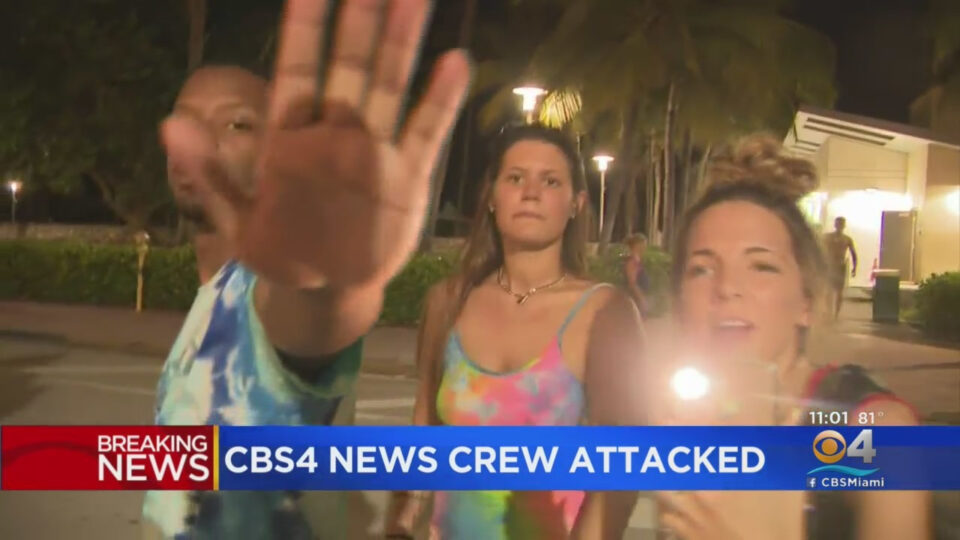Area Attracts Hard-Partying Student Tourists
Exposure of Orwellian Police Practice Awarded
Fired: Tribal College Leader Who Squashed Speech
Ad Agency Heavies Taking Notice of Black Media
. . . Black Streaming Company Aims to Fill Void
Bloomberg to Expand Coverage of Race, Diversity
Battinto Batts Named to Head Cronkite School
AAJA to Examine Asian American-Black Relations
Israeli Air Strikes Destroy Media Houses in Gaza
Myanmar Jails Reporter for 3 Years, Frees Another
Short Takes
Support Journal-ismsArea Attracts Hard-Partying Student Tourists
A news crew of two Black journalists was attacked in Miami Beach by a mostly Black crowd Wednesday night as they filmed crowd members fighting in the hard-partying entertainment district known for attracting students during spring break.
Police arrested two people, one of them Black, and charged them with criminal mischief and battery.
Ted Scouten reported Thursday for WFOR-TV, known as CBS4, “CBS4 reporter Bobeth Yates and photojournalist Ebenezer Mends were on South Beach reporting on the Miami Beach Commission passing a resolution to stop alcohol sales past 2 a.m. in the city’s entertainment district as a way to curb unruly behavior.”
Liquor sales currently are allowed until 5 a.m.
“However, while working on the story for the 11pm newscast, Mends noticed a fight near 5 Street and Ocean Drive at around 9 p.m. Mends began recording, which prompted a group to come over and demand not to be filmed.
“One man placed his hands on Mends’ camera as more people started to show up. Yates intervened once there were about five people surrounding Mends, telling them to back away and that Mends would not stop recording. Someone then knocked Mends’ camera down, causing damage.

“Yates dialed police and she followed the people that harassed her and Mends.
“Just a short time later, Mends’ camera was struck again by two different people before the crowd began to disperse.
“At some point during the incident, Yates and Mends had what they believe was alcohol thrown at them.
“ ‘Just really shaken up. Been reporting for a very long time, don’t want to date myself, but about 20 years, and I’ve never been attacked like this on a story,’ Yates recalled. ‘The ironic part was we were actually covering crime on South Beach.’ ”

Scouten also reported, “Police arrested 26 -year-old Billy Lee Bronner and 23-year-old Alysia Nicole Freed and charged them with criminal mischief and battery.
“Thursday morning, a judge ordered a $6,500 bond for Freed.
“Bronner’s bond was set at $8,500.00.”
Jawan Strader, an anchor at WTVJ-TV and president of the South Florida chapter of the National Association of Black Journalists, messaged Journal-isms, “I believe this is the first attack this year on a local news crew. I’m not aware of any anti-media sentiment on South Beach. Just the anti-media rhetoric from the past administration.
“South Beach has been dealing with a wave of violence this year attributed to a number of factors. And I’ve spoken to a few people and they believe it’s an isolated incident.”
The fracas did take place amid a background of racial tension, however.
“Miami Beach Mayor Dan Gelber told CBS4 News, ‘Our city, especially the area your reporter was in, has been projecting itself out as a hard party, party all night area and the result is we’re getting people who want to hard party and we’re getting people with that crowd, coming with pretty bad intentions’, ” Scouten reported.
“The city commission voted Wednesday to stop liquor sales in the Entertainment District at 2:00 a.m. instead of 5:00 a.m. They want to change the vibe.”
On March 29, Jessica Lipscomb reported for Miami New Times, “The fact that many of South Beach’s spring breakers are young and Black has added an extra dimension to the conversation.
“Many critics believe Miami Beach has unfairly policed and cracked down on its Black visitors instead of welcoming their business. The fact that the city has a long history of racism makes those arguments particularly resonant. At the same time, some residents say they fear for their safety, particularly when it comes to the incidents of gun violence during spring break over the past several years.”
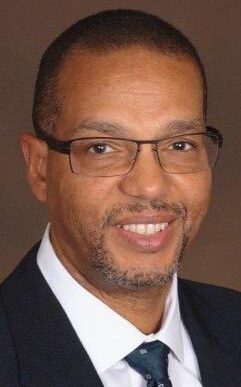 WFOR-TV is not allowing the Jamaica-born Yates and Ghana native Mends to give interviews. However, Yates spoke on the air and Darryll Green (pictured), vice president and general manager, issued this statement Thursday:
WFOR-TV is not allowing the Jamaica-born Yates and Ghana native Mends to give interviews. However, Yates spoke on the air and Darryll Green (pictured), vice president and general manager, issued this statement Thursday:
“Last night, while reporting a story about efforts to reduce violence on South Beach, CBS4 journalists were attacked on the job. Our crew was shoved and punched during the incident and some equipment was damaged.
“First and foremost, we are relieved to hear from our colleagues that they were not injured. We also want to acknowledge and thank the police officers who responded to the scene. CBS4 is dedicated to covering the issue of community violence, and will continue to pursue this important reporting.”

Exposure of Orwellian Police Practice Awarded
A Tampa Bay Times series on a “shocking police practice” in which a sheriff’s office used an algorithm to identify people that it believed might be likely to commit crimes has won the “best of show” for newspapers in the National Headliners Awards, the Press Club of Atlantic City, N.J., announced.
The Times said, “Reporters found that Pasco County residents who got caught in the agency’s sights were subjected to harassment, often having deputies show up at odd hours. More than 12,500 times, deputies checked on the people that a departmental algorithm identified as targets, the Times found.
“Those targeted were written up for missing mailbox numbers or overgrown grass. Four people who said they were victims of Sheriff Chris Nocco’s program have since filed a lawsuit against the sheriff in federal court.
“The series by Kathleen McGrory and Neil Bedi also found that the school district in Pasco County shared information on grades, discipline and attendance with law enforcement that it used to compile a secret list of students that could fall into a life of crime.
“Children with D or F grades, or those who had experienced abuse, were considered for the list, according to the law enforcement agency’s manual. That has raised privacy concerns and prompted a federal investigation. A nonprofit that sent money to the school district announced it would stop doing so. . . .”
“McGrory is now the Times’ deputy editor for investigations. Bedi joined the staff of ProPublica in Washington, D.C., in February,” the newspaper said last month, when the series won a Scripps Howard Award.
Among other Headliner Awards, “The Best in Show Television award went to Morgan Till, Nadja Drost, Bruno Federico, Carlos Villalón, Bruno Federico and Sara Just of PBS NewsHour for their story titled ‘Desperate Journey.‘
“Extraordinary, embedded, risk-filled documentary of what refugees are going through as they navigate jungles and rivers heading north to the U.S. Exceptional reporting and documenting,” the judges said. . . .”
List of winners [PDF]
Student journalist Jared Nalley sued Haskell Indian Nations University for ‘flagrantly violating’ his rights. (video)
Fired: Tribal College Leader Who Squashed Speech
“Ronald Graham has been removed as president of Haskell Indian Nations University after a tumultuous year of clashing with students and faculty members and allegations that he violated their civil rights and disregarded shared governance policies and practices,” Greta Anderson reported Friday for Inside Higher Ed.
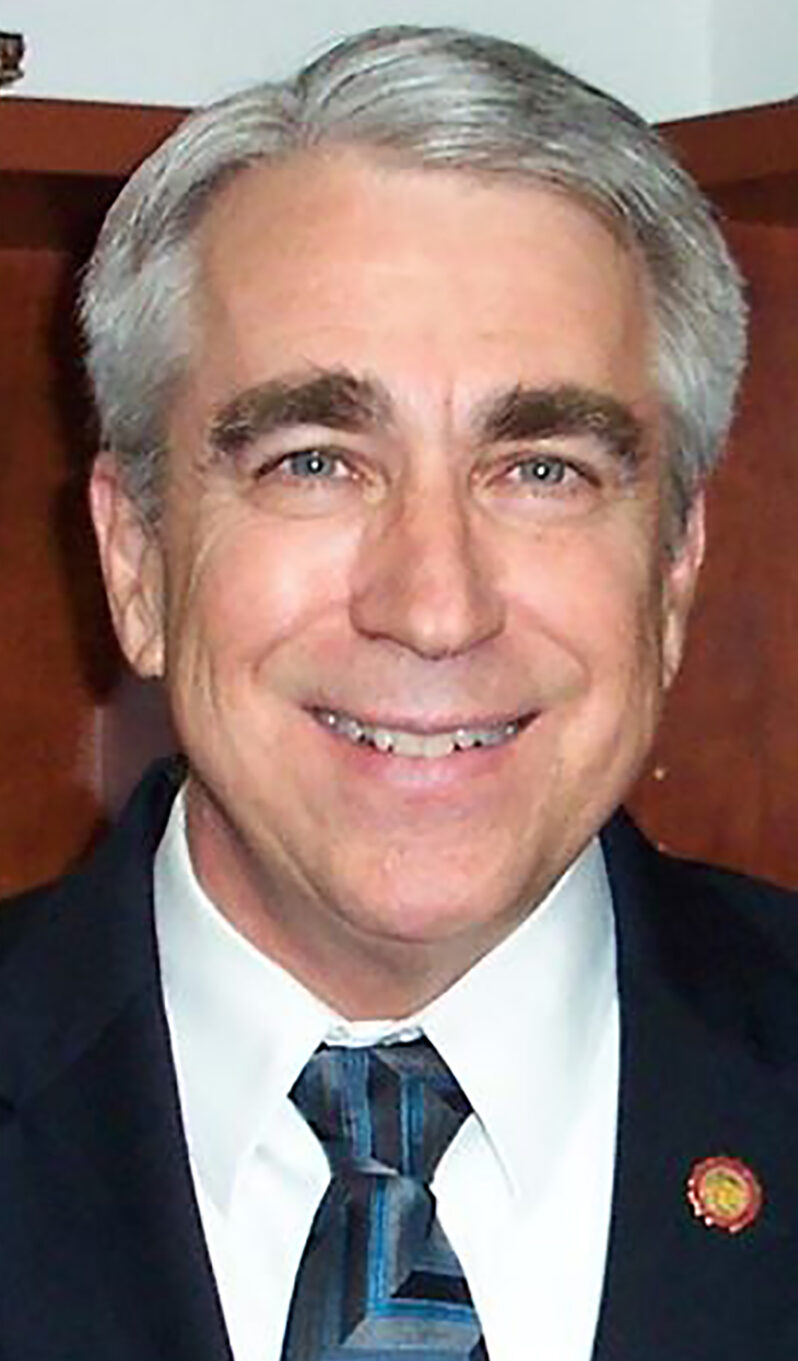 “The Bureau of Indian Education, the federal agency that oversees Haskell, a tribal college in Kansas, dismissed Graham (pictured) last week after an internal investigation of his conduct. The bureau also announced that Tamarah Pfeiffer [Diné], the bureau’s chief academic officer, is now serving as acting president, according to the Lawrence Journal-World.”
“The Bureau of Indian Education, the federal agency that oversees Haskell, a tribal college in Kansas, dismissed Graham (pictured) last week after an internal investigation of his conduct. The bureau also announced that Tamarah Pfeiffer [Diné], the bureau’s chief academic officer, is now serving as acting president, according to the Lawrence Journal-World.”
Levi Rickert reported from Lawrence, Kan., Monday for Native News Online, “Graham came under fire last fall after he forbade The Indian Leader’s editor from engaging in routine news reporting. Under Graham’s leadership, the university refused to acknowledge the newspaper, the oldest Native American student newspaper, as a student organization and subsequently reduced the newspaper’s budget by over $10,000 in funding after Graham deemed the newspaper as being too critical of the university. . . .”
In March, Mara Rose Williams wrote for the Kansas City Star, “In October, Graham threatened [student journalist Jared] Nally with disciplinary action and ordered him to stop normal reporting duties after school officials complained he was recording them without their permission, which is lawful in Kansas, and then writing about what they told him. . . .
“Nally complained to the Bureau of Indian Education that the president’s directive forbade him from doing normal journalistic work. And he started working with FIRE [Foundation for Individual Rights in Education], in collaboration with the Student Press Law Center and the Native American Journalists Association, to restore his rights as [a] student journalist.
“FIRE challenged the president’s directive in October, and three months later Graham rescinded it, saying in a letter to the foundation, ‘I commit that Haskell will not interfere in the affairs of the Indian Leader or impede the free expression rights of individual students at Haskell.’
“FIRE called the move a victory but said it never should have taken the university so long to back down. And in a second letter, FIRE told the university it needed to change language in its student code of ethics, which ‘only permits speech that is consistent with Haskell’s ‘Circle’ values,’ which are communication, integrity, respect, collaboration, leadership and excellence. . . .”
Ad Agency Heavies Taking Notice of Black Media
 “In the space of just a few weeks, a group of Madison Avenue heavyweights — with names like General Motors, Interpublic Group and WPP — has made public guarantees of ad money for some of the industry’s smaller media outlets, all owned by Black entrepreneurs,” Brian Steinberg reported Thursday for Variety. Getting these companies to talk about ad spending in public is an amazing feat. For Byron Allen (pictured), it’s just a first step.
“In the space of just a few weeks, a group of Madison Avenue heavyweights — with names like General Motors, Interpublic Group and WPP — has made public guarantees of ad money for some of the industry’s smaller media outlets, all owned by Black entrepreneurs,” Brian Steinberg reported Thursday for Variety. Getting these companies to talk about ad spending in public is an amazing feat. For Byron Allen (pictured), it’s just a first step.
“The media entrepreneur, who owns cable’s Weather Channel and recently added seven TV stations to his portfolio of holdings, says he has spent ’12 hours a day on Zoom calls since March of last year’ trying to get big advertisers to take Black-owned media more seriously. He isn’t done. . . .
“More agencies are paying attention. Interpublic’s large Mediabrands buying unit said last week it would spend ‘a minimum of 5%’ of its clients’ ad budgets in Black-owned media by 2023. Dentsu,” the largest advertising agency and the fifth largest advertising agency network in the world in terms of worldwide revenues, “said it would encourage its clients to reveal how much they spend on multicultural outlets. WPP’s GroupM said it intended to ‘invite’ clients to spend 2% or more of their total annual media budgets on Black-owned media over the next 12 months.
“ ‘Too skinny,’ says Allen of GroupM’s percentage goal. ‘You need to lean in. It needs to be better than that.’ A GroupM spokesman said the company declined to comment.”
Meanwhile, “Dentsu Inc. is launching a stand-alone division aimed at boosting diversity in the media industry by helping minority-owned companies grow and connecting them to ad buyers looking to direct more dollars to such firms,” Alexandra Bruell reported Thursday for The Wall Street Journal.
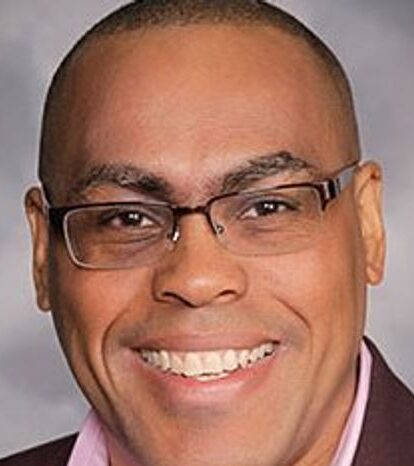 The Japanese company’s “new offering, dubbed Economic Empowerment, will be led by the recently hired veteran ad buyer Mark Prince (pictured), who will consult with the media businesses about how they can grow their operations and generate more ad revenue from marketers, many of which are looking to reach ethnically diverse audiences, Dentsu said. . . . “
The Japanese company’s “new offering, dubbed Economic Empowerment, will be led by the recently hired veteran ad buyer Mark Prince (pictured), who will consult with the media businesses about how they can grow their operations and generate more ad revenue from marketers, many of which are looking to reach ethnically diverse audiences, Dentsu said. . . . “
“The advertising industry has never been able to shake the impression that it’s not welcoming to people of color. . . .” Steinberg wrote.
. . . Black Streaming Company Aims to Fill Void
“When DeShuna Spencer sat in front of her TV to scroll through her options, she noticed a glaring problem: Nobody looked like or was representative of the people she knew,” John General wrote Tuesday for CNN. “Specifically, there were no Black characters or directors with whom she felt a connection.
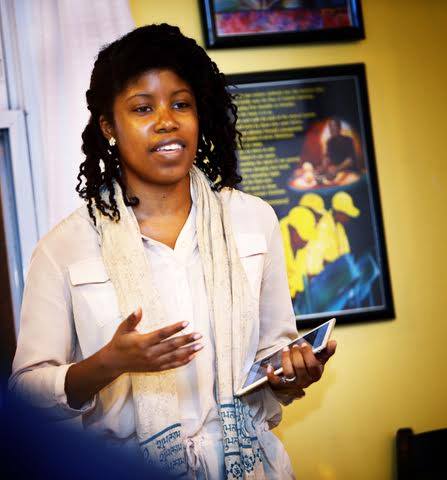 ” ‘I didn’t see my father, my brother, my husband represented,’ Spencer told CNN Business. ‘The media was really inundated with these false stereotypes.’ . . .
” ‘I didn’t see my father, my brother, my husband represented,’ Spencer told CNN Business. ‘The media was really inundated with these false stereotypes.’ . . .
“In 2015, Spencer (pictured at Journal-isms Roundtable by Sharon Farmer) launched kweliTV, a carefully curated collection of more than 500 streaming options that are, as the company puts it, ‘a true reflection of the global Black experience versus what we may sometimes see in mainstream media.’ Almost a year after George Floyd’s death sparked global protests and reignited conversations about systemic racism, kweliTV’s mission -— kweli meaning ‘truth’ in Swahili — is finding itself in an increasingly prominent position to fill a void that some dominant streaming companies have been criticized for ignoring.
” ‘White people need to be educated,’ Spencer said, noting that mainstream platforms might stream ‘The Help’ and ‘Green Book’ among other films about Black experiences, but have been criticized for being cliché. ‘[Black people] already know that history, and we don’t necessarily need to see it over and over again.’ “
General also wrote, “While kweliTV continues to make progress, it still has a long way to go relative to its competition. Netflix reported it will spend more than $17 billion on original content in 2021 alone. In comparison, kweliTV has no original content to date. In its little under six years of existence, the company has relied on its own revenue, a handful of grants, two convertible notes, and a PPP loan that was used for payroll, according to Spencer.
“The lack of funding is not on account of a lack of effort. Spencer said she learned quickly how hard it is for Black women to secure funding. And the numbers corroborate those struggles. Black women-founded companies raised $700 million between 2018 and 2019. While that’s a significant increase from years prior, it’s still just 0.27% of the total VC [venture capital] investments during that time, according to research from digitalundivided, a nonprofit that promotes Black and Latinx women entrepreneurs. . . .”
Bloomberg to Expand Coverage of Race, Diversity
“Bloomberg is expanding its business coverage of race, gender, diversity, and fairness within governments, companies, and societies with a new vertical called Equality — and a dedicated hub on its website,” Sara Guaglione reported Wednesday for Digiday.
“In addition to serving as a focal point for Bloomberg’s broader equality coverage, the new vertical will feature original journalism, such as data-based projects tracking the race and gender breakdown of companies’ employees as well as racial and ethnic disparities in vaccine distribution across the U.S., according to Jacqueline Simmons, senior executive editor for the Americas at Bloomberg News.
“Cisco is among Bloomberg Equality’s launch partners with an ad spend that spans its first year. . . .”
Battinto Batts Named to Head Cronkite School
 Arizona State University has selected Battinto Batts Jr. (pictured), a veteran journalist with fundraising expertise and an eye on broadening diversity, as head of its Walter Cronkite School of Journalism and Mass Communication, Russ Wiles reported Thursday for the Arizona Republic.
Arizona State University has selected Battinto Batts Jr. (pictured), a veteran journalist with fundraising expertise and an eye on broadening diversity, as head of its Walter Cronkite School of Journalism and Mass Communication, Russ Wiles reported Thursday for the Arizona Republic.
In a 2013 survey of the members of the Radio Television Digital News Association, Cronkite tied for fifth as the best such school in the country.
Batts, 52, “previously worked as a newspaper crime reporter, lecturer, philanthropist, strategic communications professional, higher-education administrator and nonprofit executive.
“He will become dean of the Walter Cronkite School of Journalism and Mass Communication effective July 1, replacing interim dean Kristin Gilger, who will return to the faculty as a professor in business journalism and executive director of the National Center on Disability and Journalism.
“Nearly a year ago, ASU rescinded a job offer to a newly hired dean of the Cronkite school, Sonya Forte Duhé of Loyola University in New Orleans, after allegations surfaced against her involving racism and mistreatment of students. . . .”
Wiles also wrote, “At the Scripps Howard Foundation in Cincinnati, which he joined as director of journalism strategies in 2016, Batts collaborated with board members and E.W. Scripps Co. leaders to manage journalism initiatives and set funding priorities. He also worked with others to develop a strategic plan for the direction of the foundation’s programs, resources, fundraising efforts and award money from a $65 million endowment to journalism programs across the country.
“Batts also was instrumental in the creation of the Howard Centers for Investigative Journalism at the Cronkite school and at the University of Maryland, both of which are funded by $6 million in grants from the Scripps Howard Foundation.
“The Virginia native also has held posts with the University of Cincinnati, Hampton University, the William R. Harvey Leadership Institute, the Virginian-Pilot, the Tampa Bay Times, the (Newport News, Virginia) Daily Press and the South Florida Sun Sentinel. His career began at the Richmond (Virginia) Times-Dispatch, where he covered law enforcement.”

AAJA to Examine Asian American-Black Relations
The Asian American Journalists Association “is planning conversations that examine the relationships between AAPI communities and Black communities,” AAJA’s executive director Naomi Tacuyan Underwood told the Poynter Institute’s Kristen Hare, “and how journalists can either amplify or refute the wedge that’s often shoved between our two communities.”
Under the headline, “How AAJA helped shape coverage of the Atlanta shootings,” Hare wrote Wednesday, “In 40 years, AAJA has established itself, grown, developed leadership training and helped set industry standards.
“The last year showed more of the work ahead.”
Michelle Ye Hee Lee, AAJA president and Washington Post reporter, said in the piece, “The conversation around systemic racism and the inertia in our industry that really holds journalists of color down or leaves journalists of color with the burden of creating change for ourselves, that is what fundamentally needs to change, and that means we need a wholesale rethinking of who is in power, who is making decisions.”
- Emil Guillermo, Asian American Legal Defense and Eduation Fund: This Asian Pacific American Heritage Month, do you know the Chindipinos? How about Arthur Gunn? (May 3)
- News Leaders Association: May 20 event — Addressing racial blind spots and supporting AAPI journalists (register)
Israeli Air Strikes Destroy Media Houses in Gaza
- May 15 update: Israel strike in Gaza destroys building with AP, other media (Fares Akram and Joseph Krauss, Associated Press)
“On May 11 and 12, Israeli warplanes bombed and destroyed the Al-Jawhara and Al-Shorouk office buildings in Gaza City, which house more than a dozen international and local media outlets, according to news reports, a statement by the Palestinian Journalists’ Syndicate, and Louay al-Ghoul, head of the syndicate in Gaza, who spoke to CPJ via messaging app,” the Committee to Protect Journalists said Thursday.
“Residents were warned to evacuate the Al-Jawhara building before the air strike, and planes fired two warning shots at the Al-Shorouk building before firing missiles, according to multiple news reports. CPJ could not immediately confirm whether any journalists were killed or injured in the attacks; those reports said that the buildings had been evacuated, but a report by the BBC stated that there had been unidentified “civilian deaths” in the Al-Jawhara strike. . . .”
- David M. Halbfinger, New York Times: A Press Corps Deceived, and the Gaza Invasion That Wasn’t
Myanmar Jails Reporter for 3 Years, Frees Another
“A Myanmar journalist who reported on anti-junta protests has been jailed for three years for incitement, his news organisation said, while authorities on Thursday announced a twice-arrested Japanese reporter would be freed,” Martin Petty reported for Reuters.
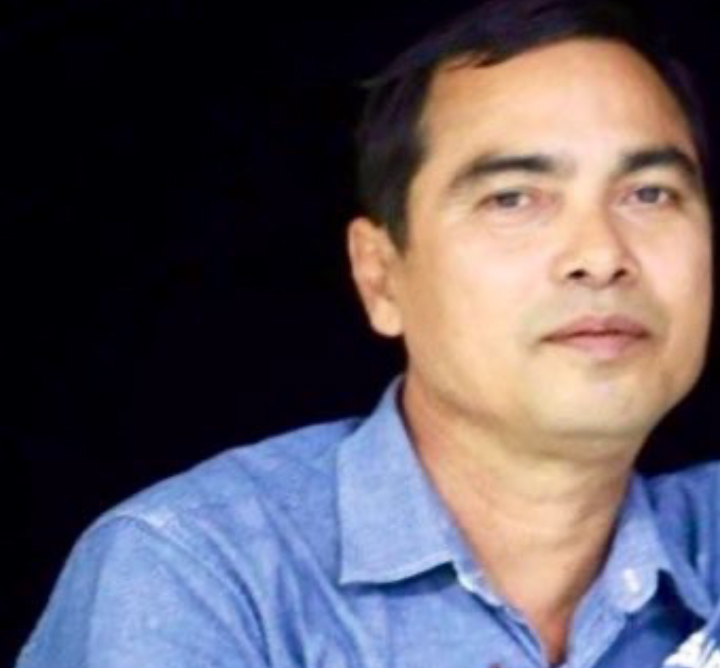 “Min Nyo (pictured), who worked for the Democratic Voice of Burma (DVB) in Myanmar’s Bago region, was arrested on March 3 and found guilty by a military court on Wednesday in one of the first verdicts against media workers since the Feb. 1 military coup.
“Min Nyo (pictured), who worked for the Democratic Voice of Burma (DVB) in Myanmar’s Bago region, was arrested on March 3 and found guilty by a military court on Wednesday in one of the first verdicts against media workers since the Feb. 1 military coup.
“ ‘DVB demands the military authority release Min Nyo immediately, as well as other detained or convicted journalists around Myanmar,’ it said.
“He had been beaten by police and denied visits by his family, it said. . . .”
The Committee to Protect Journalists added, “Myanmar’s military regime currently holds dozens of members of the press behind bars, according to preliminary data compiled by CPJ based on reporting, news reports, and research by the Assistance Association of Political Prisoners, a local rights group.
“The majority have been detained during newsroom raids or while covering anti-coup street protests, and over half face charges under Article 505(a),” which CPJ described as “a broad criminal provision that penalizes the dissemination of information that could agitate or cause security forces or state officials to mutiny.”
- Peter Guest, restofworld.org: “They want us to disappear”: Myanmar’s coup threatens to wipe out a generation of vloggers, influencers and tech entrepreneurs.
Short Takes
- The Nation announced Wednesday it is launching The Nation Fund for Independent Journalism, “a new nonprofit organization that marks our sustained commitment to the excellence and future of independent journalism. Building on The Nation’s long-standing dedication to fostering and mentoring early-career journalists, The Nation Fund will expand on that mission while developing rigorous educational programs to train the next generation of boldly independent journalists. Our mission is to invest in the future of a strong independent press by developing a robust framework that lifts up diverse voices and perspectives. . . .”
- ViacomCBS and the USC Annenberg School for Communication and Journalism announced Thursday a new scholarship “set to advance a robust pipeline for Black journalists to both enter and lead in newsrooms across the country in the near future,” CBS reported. Supported by a $1-million endowment, the ViacomCBS HBCU Diversity in Journalism Scholarship “will cover yearly tuition costs for one or more graduates of HBCUs to enroll in one of USC Annenberg’s journalism master’s programs. . . .”
- “With the one-year mark of George Floyd’s murder approaching, MPR News will take a deep look at the legacy left after Floyd’s death in the next event of its In Focus series,” Minnesota Public Radio announced. “In Focus: George Floyd’s Legacy and Impact will take place Wednesday, May 26, at 12 p.m. Central Time. This community conversation is free and open to the public.”
- “Here’s an idea to steal and adapt: WFAE and La Noticia both knew that immigration issues affecting Latinos in Charlotte needed more coverage. They decided the best way to address it was together,” Ju-Don Marshall, chief content officer and executive vice president of WFAE, an NPR public radio station in Charlotte, N.C., wrote for the American Press Institute’s Better News. “WFAE reaches a diverse population spanning 32 counties in North and South Carolina. Our partner La Noticia, a Spanish-language newspaper, has been serving Latino communities across North Carolina for 24 years, with editions in Charlotte; Raleigh, Durham and Chapel Hill; Greensboro, Winston-Salem and High Point; and Asheville and Henderson. . . .”
 Jenée Desmond-Harris (pictured), who joined The New York Times in 2017 as a staff editor commissioning and editing opinion pieces for all of its main platforms, is joining Slate as its “Dear Prudence” advice columnist. Desmond-Harris succeeds Danny M. Lavery, who held the job for the past five years. Slate editor-in-chief Jared Hahlt said in a memo, “Jenée is simply a dream hire for this role. . . . ” Slate spokeswoman Kate Rayford said Harris will continue writing a monthly column about race for the Times and that each “Dear Prudence” column receives hundreds of thousands of page views.
Jenée Desmond-Harris (pictured), who joined The New York Times in 2017 as a staff editor commissioning and editing opinion pieces for all of its main platforms, is joining Slate as its “Dear Prudence” advice columnist. Desmond-Harris succeeds Danny M. Lavery, who held the job for the past five years. Slate editor-in-chief Jared Hahlt said in a memo, “Jenée is simply a dream hire for this role. . . . ” Slate spokeswoman Kate Rayford said Harris will continue writing a monthly column about race for the Times and that each “Dear Prudence” column receives hundreds of thousands of page views.
 “Larry Madowo (pictured) is leaving the BBC to take up a new position with CNN as the network’s Nairobi-based correspondent,” CNN announced Thursday. “Madowo most recently served as the BBC’s North America Correspondent in Washington, D.C., covering major U.S. news stories including the Covid-19 outbreak, the 2020 presidential election and the protests following the death of George Floyd and the trial of Derek Chauvin. He also was a fill-in anchor for the network’s flagship BBC World News America show that airs globally and on PBS stations across the U.S.”
“Larry Madowo (pictured) is leaving the BBC to take up a new position with CNN as the network’s Nairobi-based correspondent,” CNN announced Thursday. “Madowo most recently served as the BBC’s North America Correspondent in Washington, D.C., covering major U.S. news stories including the Covid-19 outbreak, the 2020 presidential election and the protests following the death of George Floyd and the trial of Derek Chauvin. He also was a fill-in anchor for the network’s flagship BBC World News America show that airs globally and on PBS stations across the U.S.”
 “Walter Smith-Randolph (pictured) has been named the Investigative Editor/Lead Reporter for The Accountability Project at Connecticut Public,” home to Connecticut Public Television (CPTV) and Connecticut Public Radio (WNPR), the organization announced. Smith-Randolph, who is also treasurer of the National Association of Black Journalists, “will lead a team of three investigative journalists that also includes an investigative reporter and a data reporting expert.”
“Walter Smith-Randolph (pictured) has been named the Investigative Editor/Lead Reporter for The Accountability Project at Connecticut Public,” home to Connecticut Public Television (CPTV) and Connecticut Public Radio (WNPR), the organization announced. Smith-Randolph, who is also treasurer of the National Association of Black Journalists, “will lead a team of three investigative journalists that also includes an investigative reporter and a data reporting expert.”
 . . . Meanwhile, John Kiesewetter reported Thursday for Cincinnati Public Radio, “With the departure of reporter Walter Smith-Randolph, WKRC-TV has only two Black journalists on newscasts, anchors John Lomax and Kyle Inskeep. But help is on the way at Channel 12, which was publicly criticized by the Greater Cincinnati Association of Black Journalists two months ago, while two Black journalists at WCPO-TV are being promoted to weekend Good Morning Tri-State newscasts. Channel 12 has hired Dayton reporter-weekend anchor Courtney Wheaton (pictured) from Sinclair sister stations WKEF-TV and WRGT-TV. Wheaton, president of the Dayton chapter of the National Association of Black Journalists, will start as a reporter here June 1.”
. . . Meanwhile, John Kiesewetter reported Thursday for Cincinnati Public Radio, “With the departure of reporter Walter Smith-Randolph, WKRC-TV has only two Black journalists on newscasts, anchors John Lomax and Kyle Inskeep. But help is on the way at Channel 12, which was publicly criticized by the Greater Cincinnati Association of Black Journalists two months ago, while two Black journalists at WCPO-TV are being promoted to weekend Good Morning Tri-State newscasts. Channel 12 has hired Dayton reporter-weekend anchor Courtney Wheaton (pictured) from Sinclair sister stations WKEF-TV and WRGT-TV. Wheaton, president of the Dayton chapter of the National Association of Black Journalists, will start as a reporter here June 1.”
- “Alexi McCammond publicly resurfaced Thursday morning, joining MSNBC’s ‘Morning Joe’ to talk about Black women’s likely impact during the 2022 midterm elections,” Lindsey Ellefson reported Thursday for The Wrap. ” ‘Alexi, it’s great to have you back on “Morning Joe,” ‘said co-host Mika Brzezinski, who introduced McCammond simply as a writer and reporter before plugging the former Axios journalist’s new piece for NBC News’ Know Your Value vertical. A source with knowledge of the situation said Thursday ‘there are no plans’ to reinstate McCammond’s full position at the network, where she was a contributor before being named editor in chief of Teen Vogue in March. She exited that role two weeks later — before she even started on the job — after the surfacing of old racist and homophobic tweets.”
- In Britain, “Sir Trevor McDonald, 81, has become something of a TV icon over his iconic career at the helm of ITV News,” Jessica Williams reported Wednesday for the Express. “He was ITN’s first black news reporter four years after he moved to London from Trinidad in 1969 to work for the BBC World Service. But the presenter revealed that he actually turned down a job at the Beeb early on in his career after finding out it was just about ticking diversity boxes.”
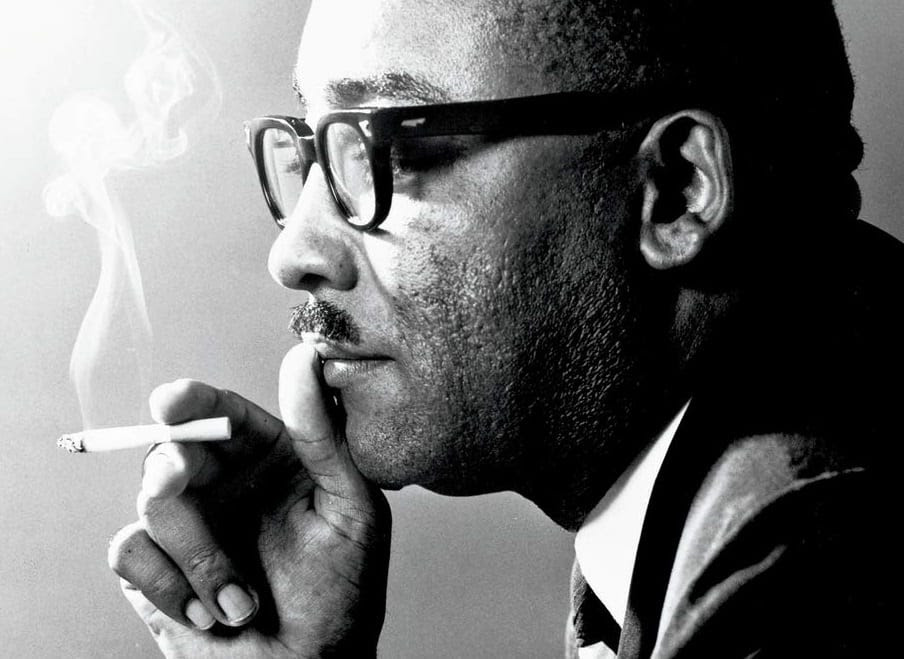 “In the decades following World War II, Louis Lomax was one of the leading commentators on Black life in the United States, the author of five books and countless stories, and the host of his own syndicated television talk show,” Joshua Clark Davis wrote Monday for Black Perspectives, published by the African American Intellectual History Society. “By the time he died in 1970, Lomax was a nationally recognized expert on Black politics. Presidential candidates called on him for endorsements and universities hired him to teach.” Davis began, “We still have far too few histories of Black journalists. Even as biographers have written on Alex Haley, Ethel Payne, Louis Austin, Emory O. Jackson, and Lerone Bennett in the last decade, many other Black reporters and editors still deserve their own studies. Thomas Aiello’s new work, The Life & Times of Louis Lomax: the Art of Deliberate Disunity, is the newest addition to this literature.”
“In the decades following World War II, Louis Lomax was one of the leading commentators on Black life in the United States, the author of five books and countless stories, and the host of his own syndicated television talk show,” Joshua Clark Davis wrote Monday for Black Perspectives, published by the African American Intellectual History Society. “By the time he died in 1970, Lomax was a nationally recognized expert on Black politics. Presidential candidates called on him for endorsements and universities hired him to teach.” Davis began, “We still have far too few histories of Black journalists. Even as biographers have written on Alex Haley, Ethel Payne, Louis Austin, Emory O. Jackson, and Lerone Bennett in the last decade, many other Black reporters and editors still deserve their own studies. Thomas Aiello’s new work, The Life & Times of Louis Lomax: the Art of Deliberate Disunity, is the newest addition to this literature.”
- “CNN’s Nima Elbagir and her team were confronted multiple times by Ethiopian and Eritrean soldiers for this Wednesday report about critical humanitarian aid being blocked in Tigray,” CNN wrote in its “Reliable Sources” column. “At one point, on the way to the scene of a grenade attack, the team said ‘a large army truck drove up and parked sideways, blocking the road. Our cameraman got out of the car and started filming only to be confronted by Ethiopian soldiers, who threatened the team with detention, demanding that we hand over the camera and delete the footage. But we refused and were able to conceal the footage until we were eventually released’. . . .”
To subscribe at no cost, please send an email to journal-isms+subscribe@groups.io and say who you are.
Facebook users: “Like” “Richard Prince’s Journal-isms” on Facebook.
Follow Richard Prince on Twitter @princeeditor
Richard Prince’s Journal-isms originates from Washington. It began in print before most of us knew what the internet was, and it would like to be referred to as a “column.” Any views expressed in the column are those of the person or organization quoted and not those of any other entity. Send tips, comments and concerns to Richard Prince at journal-isms+owner@
View previous columns (after Feb. 13, 2016).
View previous columns (before Feb. 13, 2016)
- Diversity’s Greatest Hits, 2018 (Jan. 4, 2019)
- Book Notes: Is Taking a Knee Really All That? (Dec. 20, 2018)
- Book Notes: Challenging ’45’ and Proudly Telling the Story (Dec. 18, 2018)
- Book Notes: Get Down With the Legends! (Dec. 11, 2018)
- Journalist Richard Prince w/Joe Madison (Sirius XM, April 18, 2018) (podcast)
- Richard Prince (journalist) (Wikipedia entry)
- February 2018 Podcast: Richard “Dick” Prince on the need for newsroom diversity (Gabriel Greschler, Student Press Law Center, Feb. 26, 2018)
- Diversity’s Greatest Hits, 2017 — Where Will They Take Us in the Year Ahead?
- Book Notes: Best Sellers, Uncovered Treasures, Overlooked History (Dec. 19, 2017)
- An advocate for diversity in the media is still pressing for representation, (Courtland Milloy, Washington Post, Nov. 28, 2017)
- Morgan Global Journalism Review: Journal-isms Journeys On (Aug. 31, 2017)
- Diversity’s Greatest Hits, 2016
- Book Notes: 16 Writers Dish About ‘Chelle,’ the First Lady
- Book Notes: From Coretta to Barack, and in Search of the Godfather
- Journal-isms’ Richard Prince Wants Your Ideas (FishbowlDC, Feb. 26, 2016)
- “JOURNAL-ISMS” IS LATEST TO BEAR BRUNT OF INDUSTRY’S ECONOMIC WOES (Feb. 19, 2016)
- Richard Prince with Charlayne Hunter-Gault,“PBS NewsHour,” “What stagnant diversity means for America’s newsrooms” (Dec. 15, 2015)
- Book Notes: Journalists Follow Their Passions
- Book Notes: Journalists Who Rocked Their World
- Book Notes: Hands Up! Read This!
- Book Notes: New Cosby Bio Looks Like a Best-Seller
- Journo-diversity advocate turns attention to Ezra Klein project (Erik Wemple, Washington Post, March 5, 2014)

